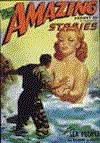|
|
|
It's time to get rid of the movie ratings system August 23, 2001 By Franklin Harris It's time to trash the motion picture industry's ratings system. The practice of rating films according to their content — branding each with a G, PG, PG-13, R or NC-17 — has become more trouble than it is worth. It stifles artists and fails to protect children from age-inappropriate material. The Motion Picture Association of America enacted its ratings system in 1966 to replace the infamous Hays Code, which censored outright all films that broke its stringent rules. If the MPAA ratings were used as intended, simply as guides for parents, they wouldn't be a problem. Unfortunately, they've become a political issue, co-opted by politicians eager for ways to stir the masses and win easy votes. When power-hungry gasbags like Sen. Joe Lieberman attack Hollywood for supposedly marketing R-rated films to teen-agers, the accusation alone is enough to frighten studio executives, especially when it comes from one of their supposed allies in the Democratic Party. So, this year we have an endless parade of inoffensive PG-13 movies. Worse is the inconsistency we get from the MPAA. Major studios can usually haggle to get the ratings they desire. But, independent filmmakers must often cut their films to avoid getting the dreaded NC-17. Which raises another problem. When then MPAA replaced the X rating with NC-17, critics hoped the change would encourage filmmakers to produce sophisticated, adults-only films that wouldn't carry the stigma of pornography. Unlike the X rating, the NC-17 rating is trademarked and remains completely within the MPAA's control, which means pornographers can't just slap it on their films indiscriminately. Unfortunately, NC-17 offered no improvement. The same theaters that refused to show X-rated movies simply changed their policies to cover NC-17 films instead. With NC-17 films carrying such an economic liability, few studios are willing to invest in them. One result is that movies that should get an NC-17 sometimes get a gentleman's R, if the MPAA's secretive ratings board is feeling generous. That makes the R rating less useful as a parental guide. The other result is that filmmakers must sometimes compromise their works, as happened with Stanley Kubrick's last film, "Eyes Wide Shut." Kubrick was contractually obligated to deliver a film that would get an R. So, when the MPAA threatened to slap "Eyes" with an NC-17, Warner Bros. put its special effects teams to work. They digitally inserted people and objects to obscure the "naughty bits," getting the movie an R rating but compromising the late filmmaker's vision in the process. No serious person is going to confuse "Eyes Wide Shut" with "Debbie Does Dallas," but the MPAA does just that. All this has led critics like Roger Ebert to propose a new rating, A. Films rated A would be for adults only but wouldn't be pornographic. But an additional rating isn't the answer. Porn distributors don't typically submit their videos to the MPAA. So, for all practical purposes, NC-17 already means what A would mean. And there is no reason to think that that an A rating won't become stigmatized, too. The only solution is to scrap the system entirely. It doesn't protect children, who seek out R-rated films precisely because they are off limits. And it is of little use to parents, since most tell pollsters that they don't understand what the ratings mean, anyway. Meanwhile, there are better alternatives. Web sites like ScreenIt.com tell you exactly what a movie's content is, allowing you to decide for yourself if it is appropriate for your children. But the MPAA's system is spreading. Under threat of congressional action, the television networks adopted a similar system in the '90s, although no one pays much attention to it, especially not viewers. So far, TV ratings have proven harmless, but so did movie ratings at first. Video game companies have also felt pressure to rate their products, although they can never do enough to please their busybody critics. And in the latest development, Marvel Comics has adopted a three-tier ratings system modeled loosely on the MPAA's. Now, before you parents write to tell me how ratings are absolutely necessary and, in fact, should be even more stringent, I ask that you consider this: The oldest mass medium of all has never had ratings. It has been the method through which some of the vilest things imaginable have been depicted. Yet no one has proposed labeling it to protect the kiddies. I'm talking about books. And even without a ratings system, no one confuses "Harry Potter" with "The Story of O." |

RECENT COLUMNS
Order a helping of Cartoon Network's 'Robot Chicken'
03/31/05
Campaign against video games is political grandstanding
03/24/05
Prize-winning author is 'Wrong About Japan'
03/17/05
Censored book not a good start
03/10/05
Some superhero comics are for 'fanboys' only
03/03/05
'Constantine' does well with its out-of-place hero
02/24/05
'80s publisher First Comics' legacy still felt
02/17/05
Director's cut gives new 'Daredevil' DVD an edge
02/10/05
Put the fun back into 'funnybooks'
02/04/05
Is 'Elektra' the end of the road for Marvel movies?
01/27/05
'House of Flying Daggers' combines martial arts and heart
01/20/05
Anniversary edition of 'Flying Guillotine' has the chops
01/13/05
Movie books still have role in the Internet era
01/06/05
Looking ahead to the good and the bad for 2005
12/30/04
The best and worst of 2004
12/23/04
'Has-been' Shatner is a 'transformed man'
12/16/04
© Copyright 2005 PULP CULTURE PRODUCTIONS
Web site designed by Franklin Harris.
Send feedback to franklin@pulpculture.net.